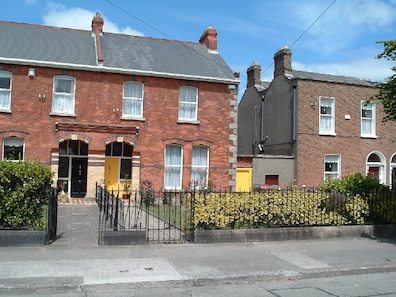Of Bloom's looking out the carriage window "at the lowered
blinds of the avenue," at the beginning of Hades,
Gifford observes that "In Irish tradition, blinds were lowered
and shops closed during a funeral in a village or, as here, on
a street or in a neighborhood." Two paragraphs later, we learn
that the house is "number nine," but not until much later does
the novel reveal that the "avenue" is Newbridge Avenue in
Sandymount, a near suburb on the southeastern edge of Dublin.
The newspaper that Bloom reads in Eumaeus discloses
that on the morning of June 16 "the remains of the
late Mr Patrick Dignam were removed from his residence, no
9 Newbridge Avenue, Sandymount, for interment in
Glasnevin." This, then, is the originating
point for the funeral procession narrated in the first half of
Hades. The carriages travel north from Sandymount
through Irishtown to
Ringsend, then move west
through the southern part of central Dublin, cross the Liffey
and turn north up O'Connell
Street, and from the top of that street they proceed
northwest to Prospect cemetery in the near northern suburb of
Glasnevin.
In the Hades of the Rosenbach manuscript and the one
published in 1918 in the Little Review, Joyce housed
Paddy Dignam's family at No. 10 Newbridge Avenue, but in the
1922 edition of the novel they live at No. 9. Apparently he
changed his plans when he learned from the 1904 Thom's directory that
No. 9 was vacant.
